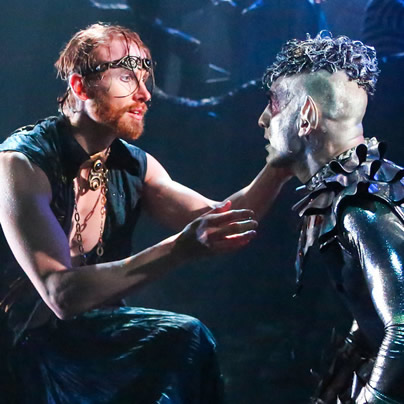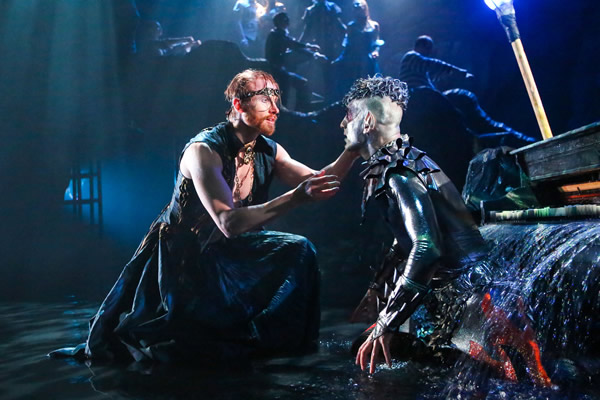Arts & Entertainment
Dark waters
Added dimension of water gives added flair to Synetic’s latest


Philip Fletcher, left, and David Istrate in Synetic’s ‘The Tempest.’ (Photo by Johnny Shrycock; courtesy Synetic)
‘The Tempest’
Through March 24
Synetic Theater
1800 S. Bell Street, Arlington
$35-$55
synetictheater.org
As it if it weren’t already daunting enough to silently interpret Shakespeare through stylized moves and gravity-defying vertical jumps, Synetic Theater has now added water to the mix. For its current take on “The Tempest,” the celebrated movement-based company has transformed its Crystal City stage into a lake of shallow dark water with stunning results.
Because the sea is so integral to the island-set romantic dramedy, performing in ankle deep water doesn’t feel all that farfetched. The play opens with Prospero, the disposed Duke of Milan, and his daughter Miranda landing on a remote, strange island. Armed with a magical staff, Prospero conjures a storm, causing his political enemies/estranged family members’ ship to wreck, landing them on the island too. And like a body of water, the story is always changing, whipsawing from splashy merriment to dangerous mystery to contemplative calm.
Paata Tsikurishvili’s lucid staging along with Irina Tsikurishvili’s wildly inventive choreography performed by a cast of impressively fit and mostly graceful young actors, go straight to the essence of the bard’s work, capturing its spirit while invigorating it with sexy, very watchable action. Whether a fight to the death between Prospoero and Caliban’s scary mother Sycorax (Victoria Bertocci) or a big dozen-person brawl, the glorious acrobatic combat scenes are stunningly staged by fight choreographer Ben Cunis.
“The Tempest” is the ninth installment of Synetic’s ongoing Silent Shakespeare Series. No dialogue is spoken. In fact, except for a few grunts and one or two harrumphs, the actors are entirely mute. And while you won’t hear Prospero waxing poetic, “We are such stuff as dreams are made on, and our little life is rounded with a sleep” or treacherous young Sebastian barking “A pox o’ your throat, you bawling, blasphemous, incharitable dog,” you will feel the full of impact of the text. What’s lost in spoken word is made up for in the expressive comedy, anger and poignancy of the movement
Shakespeare wrote “The Tempest” late in his career, incorporating varied influences from his other works. Similarly, the seasoned Synetic rises to the occasion, using its full range of skill in the retelling of this epic tale.
As Prospero, out actor Philip Fletcher convincingly conveys his character’s journey from anger to forgiveness and acceptance. His quietly compelling performance complements showier turns by Vato Tsikurishvili as the wild-eyed, indigenous island red devil Caliban and David Istrate as Prospero’s tender favorite Ariel (played as magically manic with a dash of Nosferatu creepiness by the almost unrecognizable, head-to-toe platinum-painted Synetic regular). And Irinka Kavsadze charmingly plays Miranda as an awkward girl on the precipice of becoming a lovely young woman.
With its expanse of dark water backed by a huge rock with a derelict, water-streaming grand piano to the side, Anastasia Simes’ set is serviceable yet mysteriously dreamy. Ragged curtains suggested torn ship sails and at times seaweed. Andrew F. Griffin lighting design and Riki Kim’s projections effectively create a feel of constant motion, the movement of the sea. Moody and hard driving, Konstantine Lortkipanidze’s original score helps set the scene and propel the fast-paced action forward.
For DC theater-goers, water-filled stages are all the rage around town at the moment. At Arena Stage though Sunday, Mary Zimmerman’s Tony Award-winning adaptation of Ovid’s “Metamorphoses” is being performed in a pool, and like Synetic’s latest, it’s also soaking both actors and a few intrepid front row audience members. Get wet while you can.
Books
Love or fear flying you’ll devour ‘Why Fly’
New book chronicles a lifetime obsession with aircraft

‘Why Fly’
By Caroline Paul
c. 2026, Bloomsbury
$27.99/256 pages
Tray table folded up.
Check. Your seat is in the upright position, the airflow above your head is just the way you like it, and you’re ready to go. The flight crew is making final preparations. The lights are off and the plane is backing up. All you need now is “Why Fly” by Caroline Paul, and buckle up.

When she was very young, Paul was “obsessed” with tales of adventure, devouring accounts written by men of their derring-do. The only female adventure-seeker she knew about then was Amelia Earhart; later, she learned of other adventuresome women, including aviatrix Bessie Coleman, and Paul was transfixed.
Time passed; Paul grew up to create a life of adventure all her own.
Then, the year her marriage started to fracture, she switched her obsession from general exploits to flight.
Specifically, Paul loves experimental aircraft, some of which, like her “trike,” can be made from a kit at home. Others, like Woodstock, her beloved yellow gyrocopter, are major purchases that operate under different FAA rules. All flying has rules, she says, even if it seems like it should be as freewheeling as the birds it mimics.
She loves the pre-flight checklist, which is pure anticipation as well as a series of safety measures; if only a relationship had the same ritual. Paul loves her hangar, as a place of comfort and for flight in all senses of the word. She enjoys thinking about historic tales of flying, going back before the Wright Brothers, and including a man who went aloft on a lawn chair via helium-filled weather balloons.
The mere idea that she can fly any time is like a gift to Paul.
She knows a lot of people are terrified of flying, but it’s near totally safe: generally, there’s a one in almost 14 million chance of perishing in a commercial airline disaster – although, to Paul’s embarrassment and her dismay, it’s possible that both the smallest planes and the grandest loves might crash.
If you’re a fan of flying, you know what to do here. If you fear it, pry your fingernails off the armrests, take a deep breath, and head to the shelves. “Why Fly” might help you change your mind.
It’s not just that author Caroline Paul enjoys being airborne, and she tells you. It’s not that she’s honest in her explanations of being in love and being aloft. It’s the meditative aura you’ll get as you’re reading this book that makes it so appealing, despite the sometimes technical information that may flummox you between the Zen-ness. It’s not overwhelming; it mixes well with the history Paul includes, biographies, the science, heartbreak, and exciting tales of adventure and risk, but it’s there. Readers and romantics who love the outdoors, can’t resist a good mountain, and crave activity won’t mind it, though, not at all.
If you own a plane – or want to – you’ll want this book, too. It’s a great waiting-at-the-airport tale, or a tuck-in-your-suitcase-for-later read. Find “Why Fly” and you’ll see that it’s an upright kind of book.
The Blade may receive commissions from qualifying purchases made via this post.
Theater
Out actor Kevin Cahoon on starring role in ‘Chez Joey’
Arena production adapted from Broadway classic ‘Pal Joey’

‘Chez Joey’
Through March 15
Arena Stage
1101 Sixth St., S.W.
Tickets start at $93
Arenastage.org
As Melvin Snyder in the new musical “Chez Joey,” out actor Kevin Cahoon plays a showbiz society columnist who goes by the name Mrs. Knickerbocker. He functions as a sort of liaison between café society and Chicago’s Black jazz scene circa 1940s. It’s a fun part replete with varied insights, music, and dance.
“Chez Joey” is adapted from the Broadway classic “Pal Joey” by Richard Rodgers and Lorenz Hart. It’s inspired by John O’Hara’s stories based on the exploits of a small-time nightclub singer published in The New Yorker.
A warm and humorous man, Cahoon loves his work. At just six, he began his career as a rodeo clown in Houston. He won the Star Search teen division at 13 singing songs like “Some People” from “Gypsy.” He studied theater at New York University and soon after graduating set to work playing sidekicks and comedic roles.
Over the years, Cahoon has played numerous queer parts in stage productions including “Hedwig and the Angry Inch,” “La Cage aux Folles,” “Rocky Horror” as well as Peanut in “Shucked,” and George the keyboardist in “The Wedding Singer,” “a sort of unicorn of its time,” says Cahoon.
Co-directed by Tony Goldwyn and the great Savion Glover, “Chez Joey” is a terrific and fun show filled with loads of talent. Its relevant new book is by Richard Lagravenese.
On a recent Monday off from work, Cahoon shared some thoughts on past and current happenings.
WASHINGTON BLADE: Is there a through line from Kevin, the six-year-old rodeo clown, to who we see now at Arena Stage?
KEVIN CAHOON: Anytime I want to land a joke in a theater piece it goes back to that rodeo clown. It doesn’t matter if it’s Arena’s intimate Kreeger Theatre or the big rodeo at the huge Houston Astrodome.
I was in the middle stadium and there was an announcer — a scene partner really. And we were doing a back and forth in hopes of getting laughs. At that young age I was trying to understand what it takes to get laughs. It’s all about timing. Every line.
BLADE: Originally, your part in “Chez Joey” Melvin was Melba who sings “Zip,” a clever woman reporter’s song. It was sort of a star feature, where they could just pop in a star in the run of “Pal Joey.”
CAHOON: That’s right. And in former versions it was played by Martha Plimpton and before her Elaine Stritch. For “Chez Joey,” we switched gender and storyline.
We attempted to do “Zip” up until two days before we had an audience at Arena. Unexpectedly they cut “Zip” and replaced it with a fun number called “I Like to Recognize the Tune,” a song more connected to the story.
BLADE: Wow. You must be a quick study.
CAHOON: Well, we’re working with a great band.
BLADE: You’ve played a lot of queer parts. Any thoughts on queer representation?
CAHOON: Oh yes, definitely. And I’ve been very lucky that I’ve had the chance to portray these characters and introduce them to the rest of the world. I feel honored.
After originating Edna, the hyena on Broadway in “The Lion King,” I left that to do “Hedwig and the Angry Inch” as standby for John Cameron Mitchell, doing one show a week for him.
Everyone thought I was crazy to leave the biggest musical of our time with a personal contract and getting paid more money that I’d ever made to get $400 a week at the downtown Jane Street Theatre in a dicey neighborhood.
At the time, I really felt like I was with cool kids. I guess I was. And I never regretted it.
BLADE: When you play new parts, do you create new backstories for the role?
CAHOON: Every single time! For Melvin, I suggested a line about chorus boys on Lakeshore Drive.
BLADE: What’s up next for Kevin Cahoon?
CAHOON: I’m about to do the New York Theatre Workshop Gala; I’ve been doing it for nine years in a row. It’s a huge job. I’ll also be producing the “Cats: The Jellicle Ball” opening on Broadway this spring; it’s a queer-centric uptown vogue ball with gay actor André de Shields reprising his role as “Old Deuteronomy.”
BLADE: There’s a huge amount of talent onstage in “Chez Joey.”
CAHOON: There is. I’m sharing a dressing room with Myles Frost who plays Joey. He won accolades for playing Michael Jackson on Broadway. We’ve become great friends. He’s a miracle to watch on stage. And Awa [Sal Secka], a D.C. local, is great. Every night the audience falls head over heels for her. When this show goes to New York, Awa will, no doubt, be a giant star.
BLADE: Do you think “Chez Joey” might be Broadway bound?
CAHOON: I have a good feeling it is. I’ve done shows out of town that have high hopes and pedigree, but don’t necessarily make it. “Chez Joey” is a small production, it’s funny, and audiences seem to love it.

The Capital Pride Alliance held the annual Pride Reveal event at The Schuyler at The Hamilton Hotel on Thursday, Feb. 26. The theme for this year’s Capital Pride was announced: “Exist. Resist. Have the audacity!”
(Washington Blade photos by Michael Key)











































